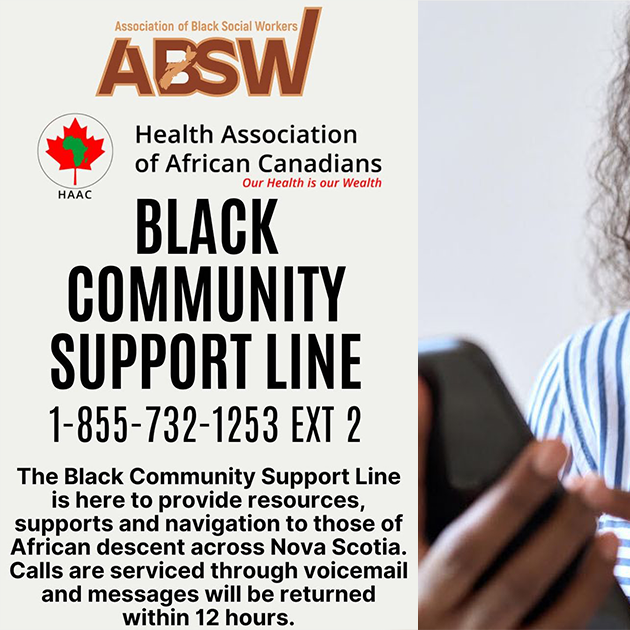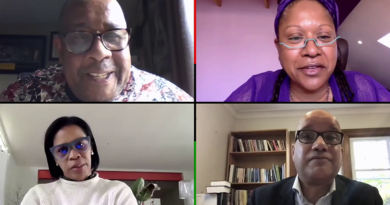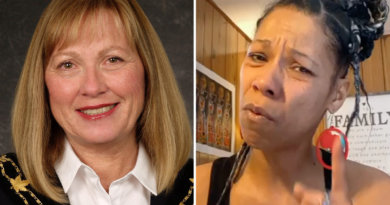DeRico Symonds: Legal Strategist talks Black Justice Strategy [VIDEO]
Derico Symonds, an advocate and activist for Black and African Nova Scotian issues from Halifax, recently did an interview with the Community Update YouTube channel.
In the interview, Symonds talked about his new role at the African Nova Scotian Justice Institute (ANSJI), ‘Canada’s Black Justice Strategy,’ and also his work experience with the provincial justice department prior to coming into his new role.
‘Canada’s Black Justice Strategy’
Symonds was hired as ANSJIs senior legal strategist.
One of Symonds’ first tasks in his new role was hosting a series of Black community engagement sessions in September, that took place in Halifax, Dartmouth, Truro, and Tracadie; in addition to several online virtual sessions.
Symonds said the purpose of the sessions is to get feedback about the Black Nova Scotian experience in dealing with things like the courts, parole, bail, and immigration.
That feedback is then meant to provide feedback and input for a federal government initiative known as Canada’s Black Justice Strategy.
Symonds said there are 11 additional organizations across Canada “having localized conversations” who will also provide feedback for the Strategy.
“I would say that I’m seeing a lot of promising conversations, however, with Canada’s Black Justice Strategy … my criticism would be that … in my opinion, it would need to be enshrined into legislation,” said Symonds.
“And so once the Strategy is written and complete, if it’s federally enshrined into legislation that takes the politics out of it because it’s now legislated, meaning that if there’s a government change, prime minister change, or priority change, this strategy for Black people isnt effected because it’s legislated.”
Symonds also talked about some of the feedback he received through the community engagement sessions and what he’d say to skeptics.
“When you’re sitting down with elderly folk, senior folk, parents whose kids aren’t even there, they’re telling a story of what they’ve went through as a family, the expenses they’ve had to incur to find proper representation for their child – I can understand from the standpoint of people (who) might say that these are embellished (stories), but until you’re sitting in a room with these folks who are emotional telling a story of how they had to empty their bank accounts just so that they were able to find proper representation to support their child, I think folks might think differently,” said Symonds.
Symonds said the Strategy has several pillars including social deterrence of justice, policing, courts, corrections, parole, reentry, and reintegration.
“Those particular components of the justice system are what the strategy is focused on.”
“There’s 11 organizations across Canada doing localized conversations and then there’s nine people who make up a steering committee, one of which is Vanessa Fells.”
“And then there’s two writers of the report, one is Zilla Jones … and then the other is (Dr. Akwasi Owusu-Bempah).”
“So that’s sort of the makeup and the gist of how the Strategy is supposed to work.”
Work Experience in the Provincial Government
Prior to being hired as Senior Justice Strategist for ANSJI, Symonds worked for the provincial government in the Office of Equity and Anti-Racism Initiatives.
In his role, he was the Executive Advisor to the Office’s Deputy Minister, Candace Thomas who recently took over as Deputy Minister for the Department of Justice.
During his tenure, Symonds said the Office of Equity and Anti-Racism Initiatives went from being a standalone Office and was later taken over by the Department of Justice (DOJ).
Symonds said that has its pros and cons.
“I think with any office, especially titled Equity and Anti-Racism, I think theres a lot of autonomy in just sort of being a standalone independent office veses being under a larger department because issues, concerns, (and) things might get lost. Because DOJ is huge,” said Symonds.
“And so I’m an advocate for it being separate, but, of course, that’s not my decision to make.”
Though where Symonds finished his term under the Department of Justice (DOJ), he says that experience will help to provide insight in his new role with the African Nova Scotian Justice Institute (ANSJI).
“Understanding how government works and how to actually get things passed, and policies and whatnot, and also understanding who’s who.”
With that that experience, he said, makes him better able to place a complaint, speak to people in government, and provide advice to people in the Black community on how to navigate.
Funding and Accountability: “There’s somewhat of a balance”
The African Nova Scotian Justice Institute (ANSJI) is largely funded through the Department of Justice through 2026.
Where ANSJI is mandated to hold the provincial justice system, including DOJ, to account, when asked if that creates a conflict of interest, Symonds said he too had questions about that when first coming into his new role.
“There’s somewhat of a balance,” he said.
“We’re funded through DOJ (with them) knowing what the Institute was to do. And if the provincial DOJ didn’t understand or respect what was in the particular proposal they wouldn’t have funded it.”
“I think that DOJ, at least now in the way that things are working, would be the best-positioned department within the province to fund (the African Nova Scotian Justice Institute (ANSJI)) … (and) in the most suitable position to fund it,” said Symonds.
“But understanding what our mandate is, and it is to hold the DOJ and other sort of surrounding folks in the periphery to account, which I think we do at ANSJI, publicly when needed, but also privately amongst some of the internal channels that we might navigate.”
See also:
-
Open Letter – Anti-Black Racism at Public Prosecution Service (July 2023)
-
African Nova Scotian Justice Institute to continue ‘invisible’ legal work with renewed funding
-
Brandon Rolle speaks about impact of Race and Culture Assessments
-
Justice minister issues directive to close loophole in street checks ban
-
Social work student collecting data about Black mothers’ experiences with child welfare system
-
Work at African Nova Scotian Justice Institute ‘something to celebrate’










